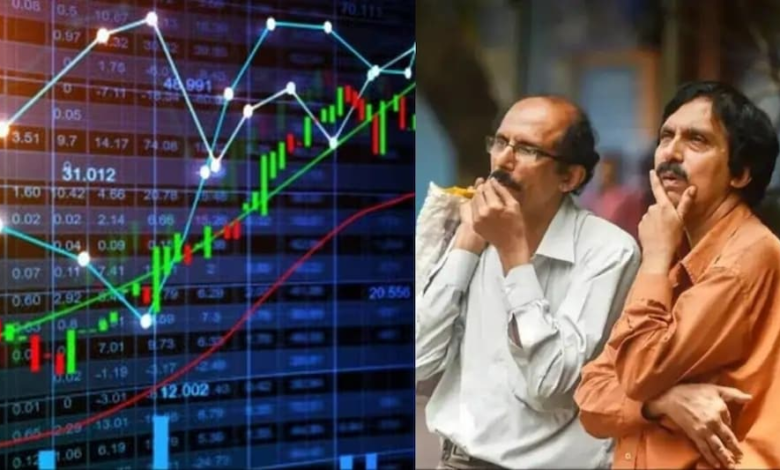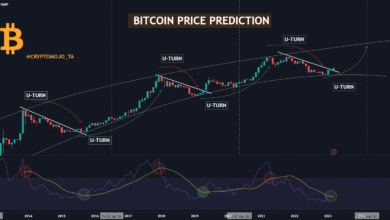Bank Stocks React to Tariff News: Market Overview

Bank stocks have been making headlines recently, particularly amid rising concerns over a potential economic slowdown in the United States. Major players like Goldman Sachs and Morgan Stanley experienced significant losses, dropping 6% as fears of a trade war escalated. Investors are closely monitoring bank stocks news to gauge the broader impact of tariffs on the financial sector and market stability. As these banks wrestle with changing economic conditions, it’s crucial for savvy investors to reevaluate their investment strategies regarding financial equities. Understanding the performance of bank stocks in the context of global economic shifts, including the fallout from escalating tariffs and the corresponding trends in related sectors like technology and commodities, can inform better financial decisions.
Financial equities, particularly those related to banking institutions, have been under intense scrutiny as market uncertainties loom large. With analysts dissecting the latest fluctuations in large financial corporations, the discussion around the implications of international trade tensions is more relevant than ever. The banking sector’s performance is often viewed as a barometer for the overall economic climate, prompting investors to seek insights on the nuances of financial assets amidst shifting tariffs and trade policies. In light of the recent downturn affecting other market sectors, including technology and manufacturing, exploring alternative investment avenues such as these financial assets is essential for portfolio diversification. By keeping abreast of the latest developments in bank stocks and their interconnectedness with the global economy, investors can navigate this complex landscape with more confidence.
The Impact of Tariffs on Bank Stocks
The recent escalation of tariffs between the U.S. and China has sent shockwaves through bank stocks, with investors growing increasingly concerned about the implications for the U.S. economy. Major players like Goldman Sachs, Morgan Stanley, and JPMorgan Chase experienced significant declines, each losing over 5% as fears of an economic pullback became more pronounced. These losses reflect the broader market’s reaction to a potential slowdown in economic activity, particularly as trade tensions continue to rise.
As tariffs impose higher costs on imported goods, banks that lend to businesses facing increased operational expenses may be at risk. The potential for reduced consumer spending, due to rising prices, could also lead to diminished earnings for these financial institutions. For investors considering strategies around bank stocks, it will be critical to monitor ongoing trade negotiations and their potential impact on overall economic conditions.
Navigating Investment Strategies Amid Trade Tensions
In light of the current trade war and its effects on market dynamics, investors must recalibrate their investment strategies to mitigate risks associated with volatile sectors, including bank stocks. Diversifying portfolios to include a mix of assets could provide a buffer against sector-specific downturns. Additionally, focusing on sectors that traditionally perform well during economic slowdowns, such as consumer staples or utilities, might offer more stability.
Furthermore, adopting a long-term view can also be beneficial. Investors should consider the historical resilience of bank stocks post-recession, indicating potential recovery once trade tensions subside. Consulting with financial analysts to explore alternative investment vehicles, such as China ETFs or defensive stock options, may enhance overall portfolio robustness against rapid market changes.
China ETF Performance in a Turbulent Market
The recent announcement of a 34% tariff on U.S. goods by China has negatively impacted the performance of China-based exchange-traded funds (ETFs). Funds such as the KraneShares CSI China Internet ETF (KWEB) and the iShares MSCI China ETF (FXI) saw substantial declines of 8% and 7% respectively. These ETFs are heavily invested in Chinese companies that rely on U.S. trade, and the uncertainty surrounding tariffs has led to increased volatility and investor apprehension.
For investors looking at China ETF performance, it’s crucial to analyze the sectors within these funds that may be most affected by U.S.-China trade relations. Technology and consumer sectors are particularly vulnerable, with fluctuations anticipated in response to tariffs and market reactions. Thus, employing careful research and timely adjustments could optimize returns from these investments in a challenging economic landscape.
The Decline of Semiconductor Stocks
Semiconductor stocks have seen significant dips amid fears surrounding the U.S.-China trade conflict. Companies like Intel and Broadcom experienced losses of around 7% as their supply chains are heavily intertwined with Chinese manufacturing. The semiconductor industry relies on global trade, and increasing tariffs disrupt both production and sales, leading to vulnerability in stock prices.
Investors should consider the broader implications of these declines for the technology sector. As the demand for semiconductors continues to grow globally, any disruption due to tariffs may affect long-term growth prospects, making careful selection of semiconductor stocks essential. Strategies such as dollar-cost averaging may help mitigate short-term volatility while positioning investors for potential rebounds as trade agreements come into play.
Apple’s Struggles with Tariffs and Production
Apple’s stock took a notable hit of 5% in premarket trading following China’s announcement of retaliatory tariffs against U.S. goods. As a tech giant that sources a considerable portion of its components and assembly from China, Apple is particularly sensitive to these trade tensions. With estimates indicating that approximately 80% of Apple’s production capacity resides in China, any disruption can greatly hinder its operational effectiveness and revenue.
Investors in Apple’s stock should closely monitor how these tariffs influence the company’s pricing strategy and ultimately affect their market share. Implementing strategies like hedging might be prudent to protect against potential downturns while considering long-term potential as Apple explores alternatives to mitigate supply chain risks.
Impact of Tariffs on Equipment Manufacturers
Equipment manufacturers such as Deere and Caterpillar also faced challenges as trade tensions persist. Declining shares—Deere down 5% and Caterpillar dropping 7%—highlight the stark reality faced by companies that rely heavily on global markets. The imposition of tariffs and the anticipated impact on construction and agricultural sectors could severely curtail demand for heavy machinery, prompting a reevaluation of operational strategies.
For investors in these sectors, it is crucial to adopt a defensive approach by diversifying into industries that may weather the storm more effectively. Monitoring government spending on infrastructure could also signal recovery opportunities for equipment manufacturers once trade disputes are resolved, presenting potential investment strategies that emphasize sector resilience.
Casino Stocks Feeling the Pressure
Casino operators, particularly those based in Macao, have also felt the strain from the soaring tariffs between the U.S. and China, with notable declines in stock prices. Las Vegas Sands lost 5%, while Wynn Resorts and MGM Resorts International followed suit with 4% drops. As a significant portion of their client base is comprised of Chinese tourists, any trade escalation could dampen travel and spending, directly affecting revenues.
Investors looking at casino stocks should be vigilant about the impact of economic pressures on travel and tourism. Analyzing trends in disposable income among Chinese consumers can provide insights into the sustained viability of these investments. Long-term recovery may hinge on the resolution of trade issues, allowing for potential rebounds in tourist-driven revenue streams.
Boeing’s Challenges Amid Tariff News
The airplane manufacturer Boeing faced a drop of 6% amidst ongoing tariff discussions that raised concerns regarding trade relations with China. As Boeing exports a significant portion of its aircraft to the Chinese market, increased tariffs impose additional costs that could impact sales and profits, leading investors to question the company’s growth strategy.
For investors, understanding Boeing’s exposure to global market dynamics becomes vital in developing informed investment strategies. By keeping abreast of developments in trade negotiations, investors can assess potential recovery strategies that may mitigate risks while monitoring performance closely as global economic conditions evolve.
Tariff Impact on Energy Stocks: The Case of Shell
Shell, a major player in the energy sector, recently experienced a 5% drop in stock price due to the ongoing fallout from tariffs, which have caused oil prices to plunge. The volatility in oil markets is often exacerbated by geopolitical tensions, making companies like Shell particularly sensitive to such fluctuations. As tariffs trigger uncertainty, investors must navigate these challenges with strategic insight.
For investors in energy stocks, assessing supply and demand fundamentals is critical. Additionally, understanding how global economic policies shape market dynamics may reveal opportunities amidst the volatility. Diversifying into renewable energy sectors or exploring energy-efficient technologies could present alternate investment strategies that align with evolving market trends.
Frequently Asked Questions
What recent news is affecting bank stocks?
Recent headlines indicate that bank stocks have faced declines due to rising fears of a U.S. economic pullback, exacerbated by a global trade war. For instance, major banks like Goldman Sachs, Morgan Stanley, JPMorgan Chase, Citigroup, and Wells Fargo saw significant drops of up to 6%. This market trend is largely linked to investor concerns over economic stability.
How do tariffs impact bank stocks?
Tariffs play a critical role in the performance of bank stocks as they can influence economic conditions and investor confidence. The recent announcement of a 34% tariff on U.S. goods by China has heightened worries about an economic slowdown, leading to sell-offs in financial stocks. Investors expect that increased trade tensions could reduce profitability for banks, thus negatively impacting their stock performance.
What investment strategies should I consider for bank stocks amid volatility?
When investing in bank stocks during volatile periods, consider strategies like diversification to mitigate risks, investing in dividend-paying bank stocks for steady income, and focusing on banks with strong balance sheets that can weather economic downturns. Monitoring macroeconomic indicators and tailoring your investments to economic forecasts can also enhance your investment strategies.
What is the relationship between bank stocks and semiconductor stock dips?
While bank stocks and semiconductor stocks are distinct sectors, they can both be affected by broader economic trends. Recent semiconductor stock dips due to heightened tariffs on goods imported from China have contributed to overall market anxiety, leading to declines in bank stocks as investors re-evaluate risk across the market.
How does China ETF performance influence bank stocks?
The performance of China-based ETFs directly influences bank stocks, especially those with significant exposure to international markets. When these ETFs, like the iShares MSCI China ETF, decline due to unfriendly trade tariffs, it can negatively impact banking institutions that are tied to global trade flows, leading to lower stock prices for bank stocks.
| Sector | Stocks Affected | Percentage Loss |
|---|---|---|
| Big Banks | Goldman Sachs, Morgan Stanley | 6% |
Summary
Bank stocks faced significant declines as fears of a U.S. economic downturn grow, amplified by ongoing global trade tensions. Major players like Goldman Sachs and Morgan Stanley reported a 6% drop, while JPMorgan Chase, Citigroup, and Wells Fargo followed closely with a 5% decline. These losses reflect how external economic pressures can heavily impact financial institutions, making it crucial for investors to monitor market conditions closely when considering investments in bank stocks.




